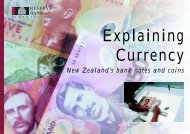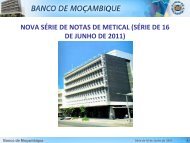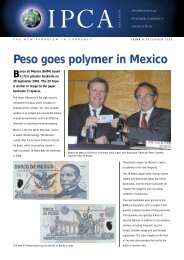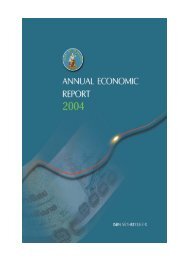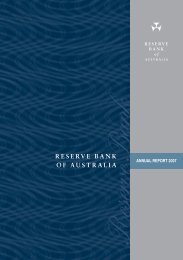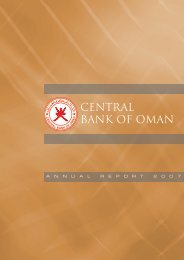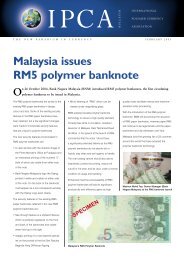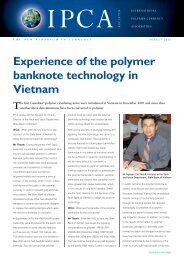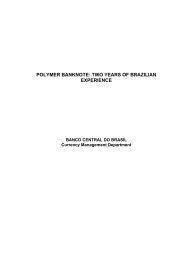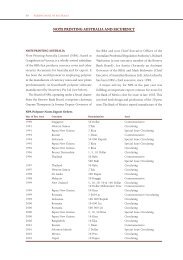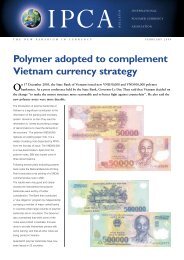Reserve Bank of Australia Annual Report 2011
Reserve Bank of Australia Annual Report 2011
Reserve Bank of Australia Annual Report 2011
Create successful ePaper yourself
Turn your PDF publications into a flip-book with our unique Google optimized e-Paper software.
Some significant changes to the IMF’s governance arrangements were approved over the past year. Following<br />
earlier G-20 commitments to better align IMF quota shares with members’ present importance in the world<br />
economy, the IMF Board <strong>of</strong> Governors approved both a doubling <strong>of</strong> IMF quotas and a shift <strong>of</strong> around 6 per cent<br />
in quota shares to dynamic emerging market and developing countries. Other governance reforms agreed<br />
included a shift to electing all members <strong>of</strong> the Executive Board and increasing the number <strong>of</strong> representatives<br />
from emerging market and developing countries.<br />
The <strong>Reserve</strong> <strong>Bank</strong> works with the <strong>Australia</strong>n Treasury to provide regular briefings to <strong>Australia</strong>’s Constituency<br />
Office at the IMF on issues being considered by the IMF Executive Board. During the year, some <strong>of</strong> the main<br />
issues discussed by the Executive Board have related to: the ongoing review <strong>of</strong> the IMF’s surveillance, particularly<br />
its multilateral and financial sector surveillance activities; potential reforms to the international monetary<br />
system, including the role and composition <strong>of</strong> the SDR; and the governance reforms noted above. The <strong>Bank</strong><br />
supports the Constituency Office directly by providing an advisor with expertise in financial markets and<br />
financial sector issues. It also provides support to other IMF activities – for example, the Assistant Governor<br />
(<strong>Bank</strong>ing and Payments) has participated in the IMF’s Financial Sector Assessment Program in China over the<br />
past 12 months.<br />
As part <strong>of</strong> its regular annual review <strong>of</strong> the <strong>Australia</strong>n economy and policy, known as the Article IV Consultation,<br />
an IMF team visited <strong>Australia</strong> in July <strong>2011</strong>. In November 2010, the IMF released its ‘<strong>Report</strong> on the Observance <strong>of</strong><br />
Standards and Codes’, which reviewed the quality <strong>of</strong> economic data gathered by various <strong>Australia</strong>n agencies<br />
including the <strong>Reserve</strong> <strong>Bank</strong>.<br />
Organisation for Economic Co-operation and Development (OECD)<br />
The OECD is an international organisation comprising the governments <strong>of</strong> 34 countries, which is committed to<br />
promoting policies that improve economic and social development globally. The OECD conducts economic<br />
research as well as regular assessments <strong>of</strong> member countries’ economic conditions and policies. <strong>Australia</strong><br />
joined the OECD in 1971, and the <strong>Bank</strong> has participated in its activities mainly through staff secondments and<br />
membership <strong>of</strong> several economics-related working groups and committees. More recently, in December 2010,<br />
the Assistant Governor (Financial System) was elected Chair <strong>of</strong> the OECD’s Committee on Financial Markets,<br />
which is the main OECD body dealing with issues in financial markets, such as banking, securities, and<br />
derivatives.<br />
Executives’ Meeting <strong>of</strong> East Asia-Pacific Central <strong>Bank</strong>s (EMEAP)<br />
EMEAP brings together central banks from 11 economies in the East Asia-Pacific region – <strong>Australia</strong>, China, Hong<br />
Kong SAR, Indonesia, Japan, Korea, Malaysia, New Zealand, the Philippines, Singapore and Thailand – to discuss<br />
monetary and financial stability, seek ways to foster closer co-operation, and exchange information and<br />
expertise on issues <strong>of</strong> common interest. The <strong>Reserve</strong> <strong>Bank</strong> participates in EMEAP at a number <strong>of</strong> levels, including<br />
the Governor and Deputy Governor. The Governor <strong>of</strong> the <strong>Reserve</strong> <strong>Bank</strong> was Chair <strong>of</strong> the EMEAP Governors in<br />
2010, with the responsibility having passed to the Governor <strong>of</strong> the <strong>Bank</strong> <strong>of</strong> Korea, Dr Choongsoo Kim, for <strong>2011</strong>.<br />
At the Deputy Governor level, the Monetary and Financial Stability Committee (MFSC) considered ways to<br />
further enhance regional co-operation and the monitoring <strong>of</strong> economic and systemic risks. In addition, the<br />
<strong>Bank</strong> continued to participate in the three working groups that report to the Deputies and support the<br />
surveillance work <strong>of</strong> the MFSC: the Working Group on Financial Markets, the Working Group on <strong>Bank</strong>ing<br />
Supervision, and the Working Group on Payment and Settlement Systems.<br />
EMEAP also retained responsibility for the ongoing oversight <strong>of</strong> Asian Bond Fund 1, a US dollar-denominated<br />
Asian bond fund, and Asian Bond Fund 2, comprising eight local currency-indexed bond funds and a Pan Asia<br />
Index Bond Fund (PAIF). The <strong>Reserve</strong> <strong>Bank</strong>’s Deputy Governor continued to chair the PAIF Supervisory<br />
Committee.<br />
ANNUAL REPORT <strong>2011</strong> | International Financial Co-operation<br />
39


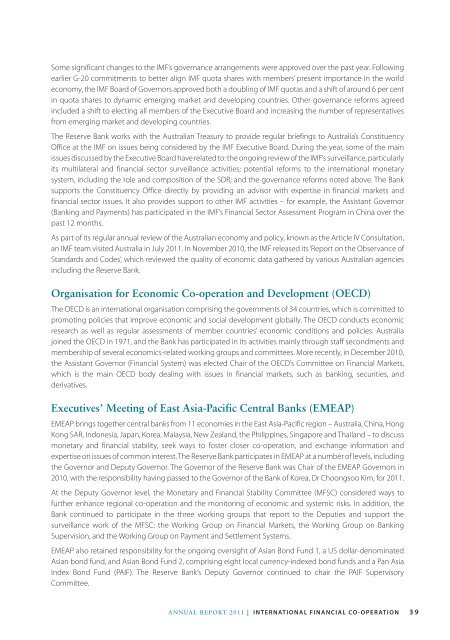
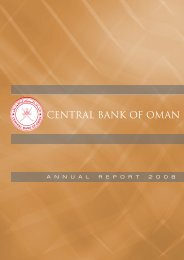
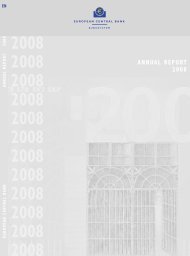
![KNOW YOUR NEW GIBRALTAR BANKNOTES - [Home] bThe/b](https://img.yumpu.com/50890985/1/184x260/know-your-new-gibraltar-banknotes-home-bthe-b.jpg?quality=85)
![PAPUA NEW GUINEA - [Home] - Polymer Bank Notes of the World](https://img.yumpu.com/49758743/1/190x143/papua-new-guinea-home-polymer-bank-notes-of-the-world.jpg?quality=85)
